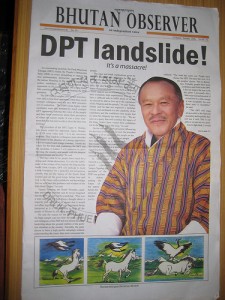Media: Consciously Unconscious
The Bhutanese media is on the footstool of a ‘great big leap’. After the initial baby steps, its bold strides have arrived to mixed reverberations of awe and applause to disgust and dread. It is perhaps time for deep soul-searching for the direction of the Bhutanese media. This ominous void is an invocation of a Bhutanese Media Model.
![]() The media is a watering hole for all the stakeholders in society. Of late, there have been genuine concerns of the negative effects of unbridled mass media, especially on our youth: TV is drenched with graphic scenes of expertly choreographed brutality and uncensored adult content, radio is spewing a whole new youth sub-culture of un-mindful hedonism and colloquial English slang, et al. There is a growing tide of changing societal values.
The media is a watering hole for all the stakeholders in society. Of late, there have been genuine concerns of the negative effects of unbridled mass media, especially on our youth: TV is drenched with graphic scenes of expertly choreographed brutality and uncensored adult content, radio is spewing a whole new youth sub-culture of un-mindful hedonism and colloquial English slang, et al. There is a growing tide of changing societal values.
The only way to arrest such unconscious trends is with a conscious policy. Hence, a Bhutanese Media Model is the ‘higher’ mandate of our policy makers. The truth is that we have negotiated Media Laws without instituting a Media Policy. This is like booking a good travel agency, only to go nowhere. So, in the ensuing melee, the media, government and public are all at each other’s throats.
A Bhutanese Media Model will uphold and transmit our national ethos. The ontology underlying our national identity is a homogeneous entity, unified by a singular ideology (GNH) and built on a sense of ‘collective agency’ (Democracy). Even with a progressive agenda, we remain fundamentally a holistic nation. A Bhutanese Media Model is the good mechanism to infuse our national ethos into mainstream society, via the omnipresent free media.
 The media must not suffer the unsavoury fate of some aspects of our education system. Let us get honest now. Today, the exploration of our kingdom, in its entire expanse, is being led by the outside world. Be it on GNH conferences, Buddhist researches and translation projects, organic farming like hazel nut cultivation, et al. Our modern education has bred a generation with no capacity or disposition to synergize our traditional value systems into a modern era.
The media must not suffer the unsavoury fate of some aspects of our education system. Let us get honest now. Today, the exploration of our kingdom, in its entire expanse, is being led by the outside world. Be it on GNH conferences, Buddhist researches and translation projects, organic farming like hazel nut cultivation, et al. Our modern education has bred a generation with no capacity or disposition to synergize our traditional value systems into a modern era.
So, the Bhutanese Media Model must define conscious roles for our media. No entity in a holistic society is treated in abstract isolation. As a cohesive part of the ‘bigger picture’, the media must play its part responsibly. The kind of media content must be dictated by the ‘needs’ of our national objectives and not by the ‘wants’ of narrow interests.
Also, without a conscious Media Policy, the tourism policy of ‘High Value, Low Volume’ will fly out of the window of every living room with DISH TV – where the ‘foreign’ invasion will be mounted, on a daily basis.
The Bhutanese Media Model would not encroach on the independence of free media. The space for ‘persuasion by dint of rational argument,’ and contradictions is valued in our dialectical systems and encapsulated in our ‘Lozey’ traditions. This stance is based on the dictum of the Middle Path philosophy that ‘all truth is relative’. It is a philosophy that goes against all extreme positions and values nuanced resolutions.
The Bhutanese Media Model must also address the sustainability of the free media in the interest of democracy. Bhutanese media, unlike most other countries, is almost totally dependent on the government. It is a test of media integrity to maintain an independent socio-political stance in the face of such constraints. Most often, the net result is to pander to the ‘lowest common denominator’ of crass commercialization, sensationalism and lack of objectivity. When such compromises happen, it is like chopping off our feet when we want shoes.
The good news is that a Bhutanese Media Model is possible. The only question is – Is the government a conscious and benevolent ‘Big Brother’?
(From Bhutan Observer weekly, March 27, 2009)
